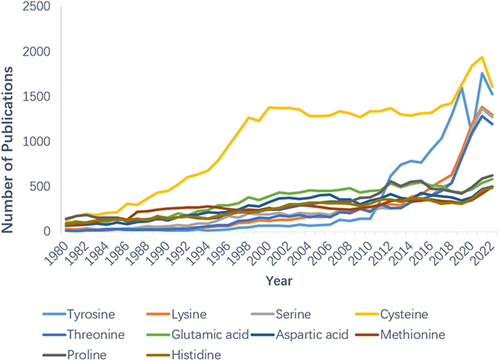MedComm-Oncology | Development of covalent inhibitors: Principle, design, and application in cancer

Open the phone and scan

Number of publications found in the SciFinder® search for covalent inhibitors closely related to targeting different amino acid residues.
Covalent inhibitors have been a rapidly growing field in drug discovery due to their therapeutic potential and unique advantages in cancer therapy. As opposed to noncovalent inhibitory drugs, covalent inhibitors reversibly or irreversibly modify proximal nucleophilic amino acid residues on proteins, aiming to selectively recognize and bind to protein targets and addressing some of the challenges faced by noncovalent drugs. Most successful targeted covalent inhibitors depend primarily on binding-site cysteine residues, but this has limitations for certain protein targets that lack targetable cysteine residues. Recently, the rational design of covalent inhibitors or covalent probes targeting other nucleophilic residues, such as lysine, tyrosine, serine, has turned out to be another promising strategy for cancer therapy. Thus, the development of novel strategies to extend the scope of covalent binding and improve the binding properties is required. This review gives a summary of the development of covalent inhibitors targeting noncysteine from different aspects, including target identification, structure–activity relationships, drug discovery strategies, and binding properties, in the hope of providing a scientific reference for future covalent drug discovery as a means of expanding research in cancer therapy.
Article Access: https://doi.org/10.1002/mog2.56
More about MedComm-Oncology: https://onlinelibrary.wiley.com/journal/27696448
Looking forward to your contributions.


